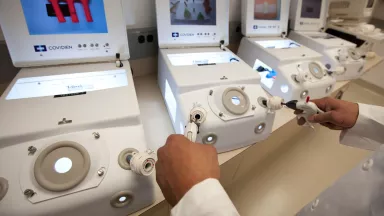Introduction
Our world-renowned orthopedic surgeons and orthopedists are experts in their fields with specialized training to provide the optimal diagnosis and treatment for a range of orthopedic conditions. We are internationally recognized for delivering the highest-quality orthopedic care to our patients.
What is a medial collateral ligament (MCL) injury?
A medial collateral ligament (MCL) injury is a sprain or tear to the medial collateral ligament. The MCL is a band of tissue on the inside of your knee. It connects your thigh bone to the bone of your lower leg. The MCL keeps the knee from bending inward.
You can hurt your MCL during activities that involve bending, twisting or a quick change of direction. For example, the MCL can be injured in football or soccer when the outside of the knee is hit. This type of injury can also occur during skiing and in other sports with lots of stop-and-go movements, jumping or weaving.
What are the symptoms of an MCL injury?
Symptoms of an MCL injury may include:
- Swelling, pain and tenderness along the inside of your knee
- Increase in pain or difficulty moving the knee several hours after injury
- Bruising
How is it diagnosed?
Your doctor will examine you and ask questions about your past health. They will also ask how you injured your knee and about your symptoms at the time of injury. Your doctor will check your range of movement, swelling and tenderness. You may have some tests, including an X-ray and an MRI.
How is it treated?
Most MCL injuries can be treated at home with rest, ice and anti-inflammatory medicine. Your doctor may suggest that you use crutches and wear a brace that protects your knee while still allowing for some movement.
You may need to reduce your activity for a few weeks. Gentle movement as advised by your doctor can help you heal.
A severe tear may need surgery, but this usually is not done unless you also injure other parts of your knee, such as the anterior cruciate ligament (ACL) or meniscus.
Your treatment will depend on how severe your injury is. There are typically three grades of injury:
- Grade 1 (Mild): These injuries usually get better in one to three weeks and may only need home treatment along with using crutches for a short time.
- Grade 2 (Moderate): These injuries usually get better in about a month. You may need to wear a hinged knee brace and limit how much weight you put on your leg.
- Grade 3 (Severe): These injuries may require wearing a hinged brace for a few months and limiting weight on the leg for four to six weeks.
How can you care for yourself?
Most MCL injuries can be treated at home. Try these steps to reduce pain and help you heal:
- Put ice or a cold pack on your knee for 10 to 20 minutes at a time with a thin cloth between the ice and your skin. Try to do this every one to two hours (when you are awake) for the first three days after your injury or until the swelling goes down.
- If your doctor recommended crutches or a brace, use them as directed.
- Prop your leg up on a pillow when you ice it or anytime you sit or lie down. Do this for about three days following your injury. Try to keep your knee above the level of your heart. This will help reduce swelling.
- Take anti-inflammatory medicines to reduce pain and swelling. These include ibuprofen and naproxen. Read and follow all instructions on the label.
- Wear a brace, if your doctor recommends it, to support your knee while it heals. Wear it as directed.
- Do stretches or strength exercises as your doctor suggests.
Physician Referrals
Montefiore Einstein embraces a collaborative approach.
If you have a patient who could benefit from our services, please reach out.
718-920-2060
Schedule a Visit
Have a general question or concern?
We’re available to help you by phone or email.
• 718-920-2060 • orthofeedback@montefiore.org






